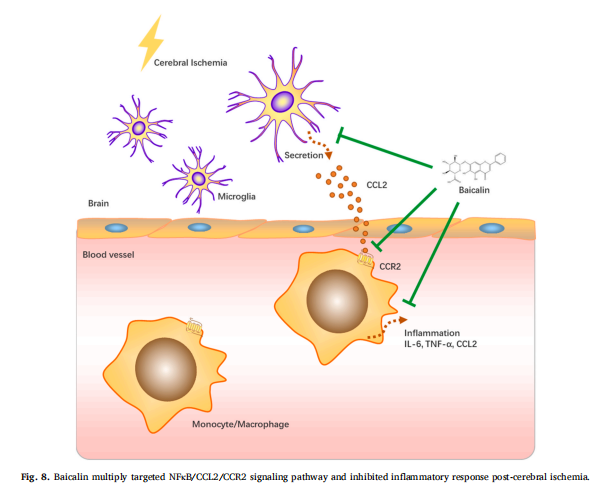Today, Reed Biotech's editor will explain a recent classic literature, in which Professor Xueqian Wang from Beijing University of Chinese Medicine discovered the potential regulatory effect of baicalin on the NFκB/CCL2/CCR2 signaling pathway in rats with cerebral ischemia using antibody-based array and bioinformatics analysis. The title of the literature is "Identification of potential regulating effect of baicalin on NFκB/CCL2/CCR2 signaling pathway in rats with cerebral ischemia by antibody-based array and bioinformatics analysis," published in the Journal of Ethnopharmacology.

1.The relationship between baicalin and cerebral ischemia? Why study it?
Baicalin is a flavonoid compound extracted from the root of Scutellaria baicalensis and can be used to treat cerebral ischemia. However, the biological mechanism of baicalin is not clear. The article aims to explore the potential biological mechanism of baicalin's anti-cerebral ischemia effects by combining antibody array and bioinformatics analysis.
2. Methods
The article used SD rats to establish the MCAO model, which is a model of cerebral ischemia (we will explain this modeling method in detail at a later opportunity), dividing them into a control group, a model group, and a baicalin treatment group. In addition, in vitro experiments were conducted using an LPS-induced RAW 264.7 macrophage model to observe the effects of baicalin.
Non-experimental part: Antibody microarray screening for high protein expression of CCL2, and simultaneous use of relevant databases to screen for the transcription factors of baicalin target protein CCL2, binding sites on the gene of CCL2, and potential promoter regions.
Experimental part: Mainly included ELISA, Western blot, H&E staining, and immunofluorescence experiments.
3. ELISA data presentation.


After cerebral ischemia, various cytokines, and chemokines are activated, mediating increased inflammatory responses, release of reactive oxygen species, neuronal damage, and further affecting the progression of the disease. The inflammatory response is a significant accelerator of the pathological progression of ischemic brain injury and can affect the patient's neurological function and disease outcomes. The article quantitatively detected the levels of the inflammatory factors TNF-α and IL-6 in rat brain tissue through ELISA experiments, as well as the levels of the pro-inflammatory chemokine CCL2. The results showed that compared to the control group, the levels of these factors were significantly increased in the model group; however, after treatment with baicalin, the levels of these factors in the rat brain tissue were significantly reduced. This indicates that baicalin can indeed reduce the inflammatory response after cerebral ischemia to a certain extent.
4. Reaction mechanism diagram

After cerebral ischemia, microglia secrete the pro-inflammatory chemokine CCL2, which acts on the C-C chemokine receptor type 2 (CCR2) on monocytes, promoting the release of large amounts of inflammatory factors IL-6, TNF-α, and CCL2. Baicalin can directly inhibit the activation of CCR2, thereby inhibiting the progression of the inflammatory response after cerebral ischemia. In summary, the process of inflammatory response after cerebral ischemia is strongly mediated by CCL2 upstream and downstream.
4. ELISA products for the relevant factors in this literature Reed Biotech offers the following ELISA products related to the literature:
|
Product Code |
Target |
Species |
Application |
Product Link |
|
RE3186R |
Rat IL-6 |
Rat |
ELISA |
http://reedbiotech.cn/pro/13574 |
|
RE1060R |
Rat TNF-α |
Rat |
ELISA |
http://reedbiotech.cn/pro/13667 |
|
RE2731R |
Rat CCL2 |
Rat |
ELISA |
http://reedbiotech.cn/pro/13591 |
The above are regular ELISA kits. In line with our market concept of focusing on customer needs, we will continue to innovate and pursue excellence. For related species targets, we will launch the Micro Fast (MF) series products in the future. Please stay tuned!
The above is the editor's literature analysis. We welcome everyone to read and follow!
Reference: [1] Xu T, Wang X, Ma C, et al. Identification of potential regulating effect of baicalin on NFκB/CCL2/CCR2 signaling pathway in rats with cerebral ischemia by antibody-based array and bioinformatics analysis. Journal of Ethnopharmacology, 2022, 284:114773. DOI:10.1016/j.jep.2021.114773.
